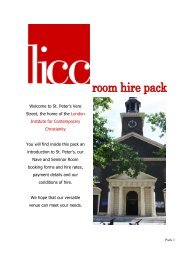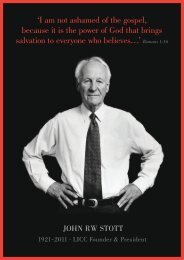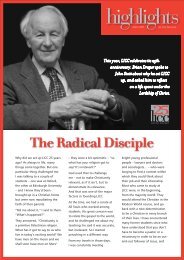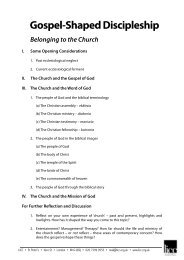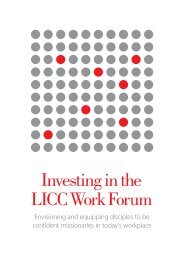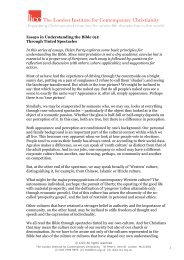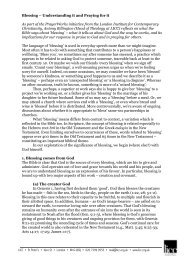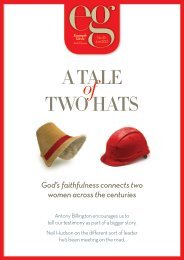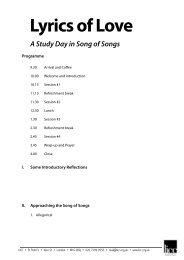Vision & Activities booklet - The London Institute for Contemporary ...
Vision & Activities booklet - The London Institute for Contemporary ...
Vision & Activities booklet - The London Institute for Contemporary ...
You also want an ePaper? Increase the reach of your titles
YUMPU automatically turns print PDFs into web optimized ePapers that Google loves.
<strong>The</strong> <strong>London</strong> <strong>Institute</strong><br />
<strong>for</strong> <strong>Contemporary</strong> Christianity<br />
Summary of<br />
<strong>Vision</strong> & <strong>Activities</strong><br />
“One of the major reasons why people reject the<br />
Gospel today is not because they perceive it to be<br />
false but because they perceive it to be trivial.”<br />
Revd Dr John RW Stott<br />
Envisioning and equipping Christians and<br />
churches to make all the difference in the world
Contents<br />
A Season of Opportunity.................................................... 3<br />
1. <strong>The</strong> Core Question............................................................. 4<br />
2. LICC – <strong>The</strong>n & Now............................................................. 5<br />
3. Our Work & the Team........................................................ 6<br />
4. Key Areas of Engagement............................................. 7<br />
5. Partnerships & Operational Principles.................. 10<br />
6. Funding & Future Growth............................................ 11<br />
7. Some Recent Quotes about LICC............................ 12<br />
Principal Officers<br />
President: Revd Dr John R W Stott CBE<br />
Chairman: Mark Ralf, Group Purchasing, Property and<br />
e-Commerce Director, BUPA<br />
Vice- Chairman: <strong>The</strong> Honourable Mr Justice Cooke<br />
Treasurer: Alison Grieve, Finance Director, Business in the Community<br />
Executive Director: Mark Greene<br />
Trustees<br />
Jeremy Bentham, Vice President, Global Business Environment, Shell<br />
Ann Holt OBE, Director, <strong>The</strong> Bible Society<br />
Revd Dave Richards, Rector, St Paul’s & St George’s Church, Edinburgh<br />
Prof John Wyatt, Professor of Ethics and Perinatology, UCL
A Season of Opportunity<br />
<strong>The</strong> <strong>London</strong> <strong>Institute</strong> <strong>for</strong> <strong>Contemporary</strong> Christianity finds<br />
itself at an extraordinary point in its history – opportunity<br />
abounds, demand soars, partner organisations increase<br />
and, above all, the core ideas that LICC was founded to<br />
champion and disseminate seem to be finding increasingly<br />
fruitful soil in the national Church.<br />
Can the <strong>Institute</strong> find the strategies and resources to<br />
maximise its impact on the Church and her mission in<br />
the UK and beyond, and see a whole new generation of<br />
churches, leaders and ‘ordinary’ Christian men and women<br />
envisioned, equipped and released <strong>for</strong>, trans<strong>for</strong>ming,<br />
missionary engagement in the real world?<br />
Could you be a part of that?<br />
3
1. <strong>The</strong> Core Question: How can we reach the West?<br />
It’s a crucial question <strong>for</strong> Western nations.<br />
And it’s a crucial question <strong>for</strong> non- Western nations.<br />
In the West, church leaders are, on the whole, wrestling with the issues presented by a<br />
significant decline in church attendance. And although there is evidence of stabilisation in<br />
some countries, there is little evidence of any vigorous recovery.<br />
Conversely, Christianity is growing in many non- Western nations but appears, in many instances,<br />
to be making little material difference to the overall well- being of those nations. Furthermore,<br />
there is a persistent call from such countries <strong>for</strong> help from the West in training Christian leaders<br />
so that new Christians can be helped to grow in Christ. However, given the evidence of decline<br />
in many Western churches, does the West actually have Gospel wisdom to offer its brothers and<br />
sisters that can help them resist the secularising <strong>for</strong>ces of consumerism?<br />
As George Barna put it after extensive US research in 2004:<br />
“<strong>The</strong> primary reason that people do not act like Jesus is because they do not think<br />
like Jesus… Although most people own a Bible and know some of its content,<br />
our research found that most Americans have little idea how to integrate core<br />
principles to <strong>for</strong>m a unified and meaningful response to the challenges and<br />
opportunities of life. We’re often more concerned about survival amidst chaos than<br />
with experiencing truth and significance.”<br />
LICC believes that the answer to the challenge of mission in the West and beyond can only<br />
begin to be met by radically rethinking the way the Church envisions and equips the people<br />
we already have so that they can make a difference where they already are.<br />
In the UK, <strong>for</strong> example, only 7.5% of the population go to church once<br />
a month or more. However, that 7.5% represents 4.5 million people.<br />
On average, each one of those people will know a hundred others. We<br />
have the people to reach the UK. Tragically however Christians have<br />
simply not been envisioned, resourced and supported to see and to<br />
take the opportunities they have to make a significant difference <strong>for</strong><br />
Christ at work, at school, in clubs and colleges and neighbourhoods.<br />
At LICC, we believe that every part of our lives comes under the Lordship of Christ, that all of<br />
life is a context <strong>for</strong> worship, mission, ministry and active Christian engagement – twenty -four<br />
hours a day, seven days a week. Every Christian is a full time Christian worker – not just pastors<br />
and youth workers and overseas missionaries.<br />
Our strategy there<strong>for</strong>e focuses on making whole-life discipleship a central, operational<br />
component of UK Church culture, thereby equipping ‘ordinary’ Christians to live and share the<br />
Gospel in the world.<br />
And this central, distinctive focus has attracted high calibre Christians from all over the world<br />
<strong>for</strong> over 25 years.<br />
4
Mark Greene<br />
2. LICC – <strong>The</strong>n and Now<br />
In 1982, the Revd Dr John Stott founded <strong>The</strong> <strong>London</strong> <strong>Institute</strong>. John himself was already a<br />
hugely influential figure in the global evangelical church and this influence was set to continue<br />
and grow. Indeed, in 2005 he was cited by Time as one of the 100 most influential people in the<br />
world today. He shared a page with Bill Gates.<br />
LICC was established to address the tragic dearth of adequate teaching and<br />
training <strong>for</strong> whole-life mission and discipleship that marked the international<br />
Church. Today, our overall role is to:<br />
Envision and equip Christians, and the leaders, churches and<br />
organisations that serve them, with the biblical framework, practical<br />
resources and models to engage biblically, relevantly and vigorously<br />
with the issues they face in today’s world.<br />
Develop and disseminate expertise in specific areas of contemporary life.<br />
For much of the first two decades of LICC’s existence we sought to fulfil this role primarily<br />
through teaching and writing, pioneering the internationally acclaimed Christian in the<br />
Modern World Course and offering a range of seminars and courses <strong>for</strong> lay people and church<br />
leaders, focused on applying biblical thinking to key areas of contemporary concern.<br />
Indeed, as a result of exposure to LICC’s focus on whole-life Christianity, there are people all<br />
over the world who are living more fruitful and liberated lives, people who have, <strong>for</strong> example,<br />
built businesses or street ministries, or re fashioned their pastoral ministry or their discipling of<br />
students, or founded institutes like LICC in their own countries, taught their children differently<br />
or boldly reached out to work colleagues.<br />
In the last seven years, since the Board’s appointment of Mark Greene as Executive Director,<br />
the <strong>Institute</strong> has continued to maintain its historic commitment to teaching but has also<br />
sought to make LICC an ‘influencing’ institution with a much more intentional strategy of<br />
bringing whole-life Christian discipleship and mission to the centre of Church thinking and<br />
strategy across the denominations.<br />
Our Mission Statement now reads as follows:<br />
To contribute to the evangelisation and trans<strong>for</strong>mation of the UK by making wholelife<br />
discipleship an unavoidable, central, operationally active component of the<br />
culture of the leaders and people of the UK Church.<br />
Whilst the focus of the statement is in the UK, the distinctive LICC perspectives apply<br />
internationally. Indeed our focus has led to the development of a number of strategic<br />
partnerships with major national and international organisations and to much more<br />
innovative ways of ‘getting the message out’, not only in new media but also through a more<br />
entrepreneurial, partnership approach to more traditional media like books and<br />
<strong>booklet</strong>s.<br />
LICC is a small organisation. However, there are actually very few comparable<br />
institutions either in the UK or in Europe, and the theological colleges are generally<br />
too small to sustain research and development in the applied areas in which LICC<br />
specialises. This crisis is made all the more acute by the very deep changes in<br />
culture that have swept through Europe in the last twenty years. Christians, like<br />
most of the general population, have been bewildered by the pace of change and have found<br />
themselves struggling to live authentically in a post -Christian society.<br />
<strong>The</strong> people are looking <strong>for</strong> Gospel wisdom <strong>for</strong> life.<br />
Church leaders are looking <strong>for</strong> Gospel wisdom <strong>for</strong> their lives and they are looking <strong>for</strong> ways to<br />
‘do church’ in this new culture that lead to sustainable numerical and spiritual growth.<br />
John Stott<br />
5
3. Our Work<br />
Overall the work has been founded on the principle of what John Stott called ‘double -listening’,<br />
listening to the word and listening to the world.<br />
With this in mind, our multi -disciplinary team seeks to engage both with macro issues – broad<br />
social trends, globalisation, the influence of mass media – and with micro issues – how can we<br />
live as radical, whole-life disciples in today’s world?<br />
We make our material and training available through a variety of channels including speaking,<br />
training seminars, weekly emails, website material, radio broadcasts, magazine articles,<br />
resource development, tape and CD provision.<br />
Brian Draper, <strong>for</strong> many years LICC’s Lecturer in <strong>Contemporary</strong> Culture and still an Associate<br />
Lecturer, regularly speaks to 2,000,000 listeners on BBC Radio 4’s Thought <strong>for</strong> the Day, and<br />
a number of organisations regularly use our materials or pass on our Word <strong>for</strong> the Week and<br />
Connecting with Culture emails through their intranet, eg Christians@Barclays.<br />
We also run a regular programme of events and seminars at our <strong>London</strong> base and, since the<br />
launch of a partnership with leaders in the North West, now also in Manchester. Indeed, our<br />
work increasingly involves engaging with partner organisations, including the denominations,<br />
in order to facilitate and resource the shift in church culture which is so crucial <strong>for</strong> the UK<br />
Church in the 21st century.<br />
<strong>The</strong> Team<br />
LICC has a teaching team of nine, most of whom are part -time:<br />
Antony Billington, Head of Faculty (100%)<br />
Ben Care, Imagine Project Facilitator (100%)<br />
Tracy Cotterell, Director, <strong>The</strong> Imagine Project (55%)<br />
Jason Gardner, Youth Researcher (80%)<br />
Mark Greene, Executive Director (100%)<br />
Nigel Hopper, Lecturer in <strong>Contemporary</strong> Culture (60%)<br />
Neil Hudson, Imagine Church Life Consultant (80%)<br />
Margaret Killingray, Lecturer in Ethics (30%)<br />
Helen Parry, Lecturer in Christian Lifestyle (30%)<br />
This teaching team is supported by an administrative team that resources them <strong>for</strong> events and<br />
courses, manages the website, and the distribution of materials and communications with<br />
friends and supporters.<br />
6
4. Key Areas of Engagement<br />
LICC’s team works in a number of key applied areas, vitally complementing and supplementing<br />
the work of theological colleges and other para church agencies. Our current major areas of<br />
focus are:<br />
Mission & Discipleship<br />
Jesus made disciples and told us to do the same. <strong>The</strong> Church in the UK<br />
and beyond, however, is focused on ‘making converts’. Indeed, there is<br />
a crisis in disciple- making in the Church. Most of the major initiatives of<br />
the past few years have focused on evangelism in the narrow sense of<br />
conversion and whilst there are still many fine teachers and preachers,<br />
good teaching on its own (LICC national research has shown) rarely<br />
leads to the whole-life discipleship that is envisaged by Christ.<br />
LICC’s Imagine Project is designed to address this crisis. Now widely<br />
supported by a variety of church leaders and organisations, it began in<br />
2003 with a robust analysis of the state of UK culture and of the Church<br />
and it identified two major blocks to achieving the Church’s mission:<br />
“Imagine is an exciting<br />
blend of the visionary<br />
and the practical, and<br />
the prize is a radical<br />
change in church<br />
culture that places the<br />
nurturing of wholelife<br />
disciples at the<br />
centre of our ef<strong>for</strong>ts<br />
to win the lost.”<br />
Derek Allan, <strong>for</strong>mer Head of<br />
Mission and Training, Baptist<br />
Union of Great Britain<br />
“Imagine is simply one<br />
of the most exciting<br />
developments in disciplemaking<br />
I’ve seen. <strong>The</strong><br />
vision is big. <strong>The</strong> task is<br />
huge. But the possibilities<br />
are endlessly exciting. Let’s<br />
unite behind this crucial<br />
initiative and change the<br />
church.”<br />
Revd James Lawrence, Director,<br />
Arrow Leadership Programme, CPAS<br />
1. <strong>The</strong> theological failure to recognise that all of life and every<br />
context is important to God. This failure inhibited the training, release and support<br />
of so -called ‘ordinary’ Christians to pursue their God -ordained ministry in their<br />
everyday contexts beyond the church.<br />
2. <strong>The</strong> methodological failure to follow Jesus’ command to make disciples, not merely<br />
converts. This has left most Christians ill- equipped to live and share the Gospel in<br />
our rapidly changing culture.<br />
<strong>The</strong>se core blocks are, broadly speaking, common to the evangelical Church globally. As such,<br />
Imagine learning has the potential to be applied globally. Indeed, even<br />
at this early stage this is happening in Spain and the Republic of Ireland.<br />
Imagine is now in Phase 4 and has already provided the church with a<br />
range of resources to help envision and equip local churches to begin<br />
the process of cultural change required to create sustainable whole-life,<br />
disciple-making communities. <strong>The</strong>se resources include a DVD, small<br />
group study resources, and a series of CD talks, books and magazines.<br />
<strong>The</strong> local church is God’s primary tool <strong>for</strong> mission and the Imagine<br />
Project gives LICC the opportunity to offer local churches a sustainable<br />
process and flexible set of resources to help them create the whole-life<br />
disciple- making culture that is critical to sustainable mission.<br />
In 2007, a pilot scheme was launched to seek to develop and disseminate<br />
wisdom on how to create these kind of churches in different contexts.<br />
This currently embraces 16 churches of different sizes, locations,<br />
denominations, churchmanship and social background. Our learning is identifying some<br />
key dynamics <strong>for</strong> change, core competencies <strong>for</strong> leadership development, and the further<br />
resources that are needed.<br />
<strong>The</strong> Imagine Project is the most obvious expression of LICC’s desire to resource whole-life<br />
mission & discipleship in the world but all our output points in that direction. For example, LICC<br />
lecturers Margaret Killingray and Helen Parry both explore how the Bible can be used to help<br />
people engage with contemporary issues. Margaret’s focus is on ethical issues, particularly as<br />
it relates to everyday decisions, whilst Helen focuses on questions of lifestyle in a consumer<br />
culture in a hungry world.<br />
7
Work<br />
“It’s the contention of many<br />
people in Britain, that what<br />
Mark Greene is saying to<br />
the Church at the moment,<br />
is as prophetic as perhaps<br />
what John Stott said to<br />
the Church in the nineteen<br />
eighties about listening<br />
both to the word and the<br />
world. God is using Mark<br />
to speak to the Church, in<br />
Britain, about our attitude<br />
towards witness and<br />
lifestyle in the workplace.”<br />
Dave Richards, Rector, St Paul’s & St<br />
George’s Church, Edinburgh<br />
Work, paid and unpaid, matters to God and is a primary context <strong>for</strong> ministry, mission and<br />
witness. Yet patterns of work in the UK are having a hugely damaging impact on health –<br />
physical and mental – relationships and communities. Furthermore, it remains the case that<br />
the vast majority of Christians are not envisioned or equipped <strong>for</strong> their mission and ministry<br />
at – and through – work. In this context, LICC personnel have been pioneers in workplace<br />
ministry <strong>for</strong> over 20 years and have not only spoken and taught nationally and internationally<br />
but have been responsible <strong>for</strong> a number of ‘firsts’ in this vital area:<br />
<strong>The</strong> first workplace video resource – A <strong>Vision</strong> <strong>for</strong> Workplace Ministry<br />
<strong>The</strong> first guide to resource pastors <strong>for</strong> workplace ministry – Supporting Christians at<br />
Work – reprinted twice and translated into several languages<br />
<strong>The</strong> first small group video resource – Christian Life & Work<br />
<strong>The</strong> first resource <strong>for</strong> graduates and final year students – Transition: the graduate’s<br />
guide to life after university – reprinted and translated into several languages<br />
In addition, LICC has significantly contributed to putting work on the agenda of the national<br />
church, not only through the work of Mark Greene and Tim Vickers who as an LICC employee<br />
pioneered the preparation of students <strong>for</strong> working life through the UCCF network, but also<br />
through the development of a team of Associate Workplace Speakers. This<br />
team of twelve are used not only in local church contexts but at national<br />
conferences like Spring Harvest, New Horizon and New Wine. Three of them<br />
have written <strong>for</strong> major publishers, most recently Paul Valler whose book Get<br />
a Life was published in 2008.<br />
Listening to the World: Attitudinal Research<br />
“Be quick to listen” James tells us. Astute research is vital in developing<br />
effective strategies and relevant resources and in anticipating issues so that<br />
the Church can be pro active, not simply reactive. LICC has undertaken a<br />
disciplined programme of attitudinal research led by our <strong>for</strong>mer Director of<br />
Research, Nick Spencer. This has led to five major unduplicated projects:<br />
Beyond Belief – Barriers and Bridges to Faith Today which looked<br />
at the attitudes of agnostics to faith, church and Christianity today.<br />
Beyond Belief has been reprinted and some 8,000 copies already<br />
distributed. It has also led to two further publications I’d like to<br />
believe but… by Michael Green, and <strong>The</strong> Responsive Church by Nick<br />
Spencer and Graham Tomlin.<br />
Beyond the Fringe – commissioned by the Diocese of Coventry, this research<br />
examined the attitudes of people with little or no church contact. Again it led to two<br />
further publications: Evangelism in a Spiritual Age and a handbook <strong>for</strong> churches<br />
Equipping your Church in a Spiritual Age.<br />
Imagine what the People Said – questionnaire research among 800 evangelicals<br />
from across the denominations. This research identified the major issues they were<br />
facing and the extent to which the church resourced them <strong>for</strong> contemporary life. See<br />
the results at www.licc.org.uk/imagine.<br />
8
Body Language – this project is exploring different strategic approaches to<br />
communicating the Gospel through advertising. <strong>The</strong> goal is the development of<br />
a coherent, integrated advertising and communication strategy <strong>for</strong> the Church in<br />
the UK, involving the denominations and the major Christian agencies committed<br />
to public media communication. <strong>The</strong> first wave of concept research has now been<br />
completed.<br />
Finding Faith in Scotland – Revisiting John Finney’s work in England but a decade<br />
later in a different country. This in-depth research, exploring how and why people<br />
come to faith in Christ, is an important contribution to developing a ‘missionshaped<br />
church’.<br />
Engaging with the Bible<br />
Prior to joining LICC, Antony Billington taught Hermeneutics and Biblical<br />
<strong>The</strong>ology at <strong>London</strong> School of <strong>The</strong>ology <strong>for</strong> sixteen years. As Head of<br />
Faculty, his role is to contribute to, and develop, the biblical and theological<br />
breadth and depth of the LICC faculty and our ongoing work with Christians,<br />
churches, and church leaders. He brings to this task a desire to see Scripture<br />
handled appropriately and applied wisely, in a way that will inspire and<br />
equip people to engage with the whole of life from the perspective of a<br />
biblical worldview.<br />
2009 has seen the launch of Word <strong>for</strong> the Week: Whole Life, Whole Bible – a<br />
50-week series of emails designed to move through the main contours of<br />
the biblical story, seeking to show how a whole-life perspective is woven<br />
through Scripture as a whole, from beginning to end.<br />
“LICC’s Word <strong>for</strong> the<br />
Week and Connecting<br />
with Culture are always<br />
insightful, challenging<br />
and inspiring. <strong>The</strong>y<br />
cause me to pause<br />
and reflect prayerfully<br />
on issues that might<br />
otherwise pass me by.”<br />
Chris Stoddard, RUN (Reaching<br />
the Unchurched Network)<br />
Engaging with Culture<br />
Nigel Hopper is LICC’s Lecturer in <strong>Contemporary</strong> Culture. An accredited Baptist Minister, and<br />
<strong>for</strong>mer Editor with Scripture Union, Nigel is passionate about the potential <strong>for</strong> Christians to<br />
trans<strong>for</strong>m their culture through distinctively biblical engagement with it. To this end he will<br />
be seeking to develop teaching programmes on Christian cultural engagement that can be<br />
delivered primarily in the context of the local church. Nigel also edits our weekly Connecting<br />
with Culture email, as well as our quarterly mailing publications: Highlights and EG magazine.<br />
Engaging with Youth<br />
Jason Gardner, our youth researcher, has been exploring the generation gap in society and the<br />
church and his book Mend the Gap: can the church reconnect the generations? was published<br />
by IVP in 2008. This work which focuses on how churches can create multigenerational<br />
discipling communities is now honing in on the area of youth discipleship. In an age where<br />
many young people’s understanding of faith and spirituality is minimal or non existent how<br />
do we successfully nurture whole life young disciples?<br />
To this end the project seeks to practically engage with those at the cutting edge of mission<br />
to young people today – providing teaching and insight as well as aiming to discern best<br />
practice when it comes to making disciples. It also aims, by providing training and resources,<br />
to encourage Churches to raise the stakes when it comes to equipping young people <strong>for</strong> life<br />
and leadership within a predominantly secular society.<br />
9
5. Innovative Partnerships and<br />
Operational Principles: Getting the Word Out<br />
It’s one thing to develop good thinking and resources, it’s quite another to get the word out.<br />
<strong>The</strong>re is wisdom development and wisdom distribution. So, as an influencing institution,<br />
partnerships are vital to our goals. If you want to be effective yeast, someone needs to put<br />
you in the dough. Indeed, over the last three years we have seen an increasing number of<br />
organisations wanting to work with us to achieve maximum quality and maximum impact at<br />
minimum cost. As such, our partnerships are governed by certain key principles:<br />
Focus on influence – not organisational glory<br />
LICC is committed to putting the kingdom goal be<strong>for</strong>e branding and organisational kudos,<br />
trusting that even if a partner gains more ‘credit’ <strong>for</strong> an initiative, this matters less than that<br />
the initiative is fruitful.<br />
Focus on reach – not royalties<br />
It is more important to get material out than to worry too much about royalties <strong>for</strong> authors.<br />
This has opened up radically different <strong>for</strong>ms of publishing and print distribution in a number<br />
of successful cases:<br />
Supporting Christians at Work was distributed at a low price through bishops,<br />
denominational leaders, partner organisations, reaching over 34,000 leaders.<br />
Probably the most widely distributed major pastoral resource of the last 20 years.<br />
Imagine how we can reach the UK was offered to the Evangelical Alliance and they<br />
have given a whole issue of their magazine, Idea, to its publication. <strong>The</strong> result was<br />
that it reached 47,000 through their network and sparked a major national mission<br />
project. In 2009, LICC was able to distribute a specially commissioned copy of the<br />
Imagine essay to all 15,000 adults attending Spring Harvest.<br />
Supporting Christians in Education has been widely distributed to denominations,<br />
dioceses and Christian organisations in conjunction with the Trans<strong>for</strong>ming Lives<br />
DVD, produced by the Staple<strong>for</strong>d Centre.<br />
Our partners include the Evangelical Alliance, the Baptist Union of Great Britain, Spring<br />
Harvest, Alpha in the Workplace International and Reaching the Unchurched Network (RUN).<br />
Similarly, we work with a large number of para church organisations, conference<br />
providers and churches from across the denominations – CofE, <strong>The</strong> Methodist Connexion,<br />
Elim, Fresh Expressions, New Frontiers, Church of Scotland, Emergent and Salt and Light<br />
– with a wide range of theological emphases – from Keswick to New Wine.<br />
Alpha in the Workplace<br />
Bands<br />
<strong>The</strong> Baptist Union of Great Britain<br />
<strong>The</strong> Bible Society<br />
<strong>The</strong> Business Studies Group<br />
CARE<br />
Christian <strong>Vision</strong> <strong>for</strong> Men<br />
Christianity<br />
Christians at Work<br />
Elim<br />
<strong>The</strong> Evangelical Alliance<br />
Fresh Expressions<br />
Fusion<br />
Graduate Impact<br />
His Church at Work<br />
Jubilee Centre<br />
<strong>The</strong> Keswick Convention<br />
Lawyers Christian Fellowship<br />
<strong>The</strong> Methodist Connexion<br />
Mainstream<br />
Mission Scotland<br />
New Wine<br />
New Horizon<br />
Pentecost Festival<br />
Premier Radio<br />
Regent <strong>The</strong>ological College<br />
RUN<br />
Salvation Army<br />
10
Soul Survivor<br />
Spring Harvest<br />
St Paul’s <strong>The</strong>ological College<br />
Tearfund<br />
Trans<strong>for</strong>m Work UK<br />
UCB<br />
UCCF<br />
Urban Saints (<strong>for</strong>merly Crusaders)<br />
Vineyard<br />
Youthwork<br />
6. Funding & Future Growth<br />
Although there is enormous demand <strong>for</strong> our team, LICC is primarily dependent on donations<br />
from individuals and Trusts because churches, conferences and colleges are rarely able to pay<br />
anything approaching the full cost of developing and presenting our material. We have over<br />
1,000 ‘Friends’, and our funding base has increased over the last five years quite considerably.<br />
This has enabled us to expand our staff as well as to generate much higher levels of output.<br />
However, we do need new partners to consolidate our financial base and to help us realise the<br />
medium- term vision. Our current annual budget is £840,000.<br />
Looking to the future, LICC’s primary objective is to make whole-life Christianity<br />
unavoidable and central in the UK Church. This is an ambitious goal and a longterm<br />
goal that can only be achieved through a persistent strategy that combines<br />
inspirational Biblical teaching with the practical methods to make this a reality<br />
in the lives of individuals, churches, Christian agencies and, vitally, theological<br />
training colleges.<br />
Looking to the future<br />
With that in mind, LICC recognised that we needed to grow our capacity to address these<br />
issues both through our own staff and through the development and deployment of others<br />
who share the vision, as has been the case with our Associate Workplace Speakers.<br />
As a result we have made three appointments:<br />
A full- time Head of Faculty, Antony Billington, to help meet the growing demand generated<br />
by LICC’s general vision, address the needs of the theological colleges and develop the<br />
resources <strong>for</strong> church- based whole-life discipleship courses.<br />
A part-time web-editor, Nigel Hopper, to strategise, develop and manage LICC’s online delivery.<br />
A full-time Project Facilitator, Ben Care, to enable the Imagine team to develop and deliver<br />
new products and resources, and further LICC’s engagement with, and insight into, local<br />
church congregations at grass roots level.<br />
We need to appoint a faculty person to build on LICC’s substantial, though foundational,<br />
workplace resources and develop biblical responses to the range of complex issues and<br />
challenges Christians now face in living out their faith in the marketplace and in seeking to<br />
influence structures, systems and values as well as individuals.<br />
We envisage that this will increase our budget to around £950,000 per annum by 2010.<br />
Three projects are key to the next stage of LICC’s development. All are strategic and have<br />
global traction. However in terms of LICC’s strategy their order of priority and execution is:<br />
<strong>The</strong> Imagine Project<br />
Developing a whole-life Christianity church training resource<br />
Appointing a Director of Workplace Ministries<br />
Can you help us envision and equip churches, leaders and ‘ordinary’ Christians <strong>for</strong> missionary<br />
engagement in the real world?<br />
•••••<br />
“I think whole-life<br />
discipleship is<br />
the most pressing<br />
issue facing the<br />
church today.”<br />
Rt Revd Graham Cray,<br />
Bishop of Maidstone,<br />
speaking at LICC<br />
11
“Reflecting on how men and women become followers and<br />
then disciples of Jesus Christ in our post- Christian and<br />
post -Christendom society are among the most potentially<br />
significant issues facing Christianity in the west today.<br />
Support <strong>for</strong> Imagine, and its emphasis upon contemporary<br />
disciple making is there<strong>for</strong>e not peripheral, but crucial.”<br />
Revd Dr Martyn Atkins, Principal, Cliff College<br />
“Imagine is simply one of the most exciting developments in<br />
disciple-making I’ve seen. <strong>The</strong> vision is big. <strong>The</strong> task is huge.<br />
But the possibilities are endlessly exciting.”<br />
Revd James Lawrence, Director, Arrow Leadership Programme, CPAS<br />
“LICC’s resources have been invaluable in helping us think<br />
through and articulate our mission approach as a church.”<br />
Mark Ralf, Church Leader & Group Purchasing, Property and e-Commerce Director, BUPA<br />
“Thank you so much <strong>for</strong> sending me Word <strong>for</strong> the Week and<br />
Connecting with Culture – they are really helpful in giving<br />
me ideas and tips on how to be more efficient in my ministry<br />
working among street gangs, church-planting in urban poor<br />
areas and campus ministry in the Philippines.”<br />
Pastor Choy Magdaong, <strong>Institute</strong> <strong>for</strong> Studies in Asian Church and Culture<br />
“LICC is a very <strong>for</strong>ward -looking organisation,<br />
and their research takes the trouble to interview and<br />
discover the views of agnostics, who actually represent<br />
the mainstream of our population.”<br />
Michael Green, Senior Research Fellow, Wycliffe Hall, Ox<strong>for</strong>d<br />
“Never a week goes by without me giving thanks <strong>for</strong> your<br />
ministry and never a week goes by without me finding<br />
something stimulating and interesting in what you write.”<br />
Mike Parker, Middle East Director, Middle East Christian Outreach<br />
“I find the articles and in<strong>for</strong>mation which you freely<br />
post on the LICC’s site to be very helpful and thought<br />
provoking. I have long hoped <strong>for</strong> sites like yours and often<br />
searched in vain!”<br />
Peter Jordan<br />
“LICC’s Toolbox Course was probably the best non- work<br />
course I have ever attended – practical, useful and thoughtprovoking.<br />
It has given me the tools and confidence to go and<br />
make a difference.”<br />
Kevin Streater, Practice Manager, Sun Microsystems Ltd<br />
<strong>London</strong> <strong>Institute</strong> <strong>for</strong> <strong>Contemporary</strong> Christianity<br />
St Peter’s · Vere Street · <strong>London</strong> · W1G 0DQ<br />
(t) 020 7399 9555 · mail@licc.org.uk · www.licc.org.uk



